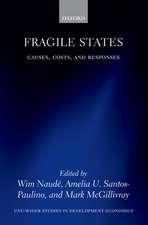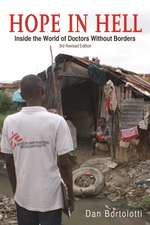Japan's Foreign Aid to Africa: Angola and Mozambique within the TICAD Process: Routledge Contemporary Japan Series
Autor Pedro Amakasu Raposoen Limba Engleză Hardback – 22 aug 2013
Tracing Japanese foreign aid to Africa during and after the Cold War, this book examines how the TICAD process sits at the intersection of international relations and domestic decision making. Indeed, it questions whether the increase in aid has been driven by domestic changes such as demands from civil society and donor interest, or pressures emanating from the international system. Taking Angola and Mozambique as case studies, the book explores how Japan’s development cooperation with Africa has assisted previously war torn states make the transition from war to peace, and in doing so demonstrates the centrality of human security to Japanese foreign policy as a means of ensuring sustainable development.
This book will have great interdisciplinary appeal to students and scholars of Japanese and African studies, Japanese politics, international relations theory, foreign policy, economic development and sustainable development.
| Toate formatele și edițiile | Preț | Express |
|---|---|---|
| Paperback (1) | 321.86 lei 6-8 săpt. | |
| Taylor & Francis – 22 noi 2017 | 321.86 lei 6-8 săpt. | |
| Hardback (1) | 814.17 lei 6-8 săpt. | |
| Taylor & Francis – 22 aug 2013 | 814.17 lei 6-8 săpt. |
Din seria Routledge Contemporary Japan Series
-
 Preț: 268.83 lei
Preț: 268.83 lei - 14%
 Preț: 755.54 lei
Preț: 755.54 lei - 26%
 Preț: 756.43 lei
Preț: 756.43 lei -
 Preț: 252.93 lei
Preț: 252.93 lei -
 Preț: 265.58 lei
Preț: 265.58 lei -
 Preț: 257.16 lei
Preț: 257.16 lei -
 Preț: 254.86 lei
Preț: 254.86 lei -
 Preț: 664.74 lei
Preț: 664.74 lei - 14%
 Preț: 289.83 lei
Preț: 289.83 lei - 26%
 Preț: 811.43 lei
Preț: 811.43 lei - 23%
 Preț: 323.57 lei
Preț: 323.57 lei - 26%
 Preț: 811.68 lei
Preț: 811.68 lei - 26%
 Preț: 814.72 lei
Preț: 814.72 lei - 13%
 Preț: 347.83 lei
Preț: 347.83 lei - 32%
 Preț: 318.41 lei
Preț: 318.41 lei - 26%
 Preț: 786.61 lei
Preț: 786.61 lei - 26%
 Preț: 811.32 lei
Preț: 811.32 lei - 43%
 Preț: 191.65 lei
Preț: 191.65 lei - 26%
 Preț: 815.05 lei
Preț: 815.05 lei - 26%
 Preț: 813.11 lei
Preț: 813.11 lei - 50%
 Preț: 537.19 lei
Preț: 537.19 lei - 26%
 Preț: 811.14 lei
Preț: 811.14 lei - 18%
 Preț: 268.07 lei
Preț: 268.07 lei - 26%
 Preț: 814.53 lei
Preț: 814.53 lei - 26%
 Preț: 813.63 lei
Preț: 813.63 lei - 17%
 Preț: 270.26 lei
Preț: 270.26 lei - 26%
 Preț: 840.99 lei
Preț: 840.99 lei - 26%
 Preț: 839.74 lei
Preț: 839.74 lei - 38%
 Preț: 186.98 lei
Preț: 186.98 lei - 26%
 Preț: 782.87 lei
Preț: 782.87 lei - 23%
 Preț: 322.33 lei
Preț: 322.33 lei - 23%
 Preț: 319.89 lei
Preț: 319.89 lei - 39%
 Preț: 222.05 lei
Preț: 222.05 lei - 26%
 Preț: 843.11 lei
Preț: 843.11 lei - 26%
 Preț: 813.11 lei
Preț: 813.11 lei - 17%
 Preț: 128.54 lei
Preț: 128.54 lei - 26%
 Preț: 759.61 lei
Preț: 759.61 lei - 27%
 Preț: 809.73 lei
Preț: 809.73 lei - 26%
 Preț: 813.63 lei
Preț: 813.63 lei - 26%
 Preț: 815.78 lei
Preț: 815.78 lei - 26%
 Preț: 814.72 lei
Preț: 814.72 lei
Preț: 814.17 lei
Preț vechi: 1104.63 lei
-26% Nou
Puncte Express: 1221
Preț estimativ în valută:
155.95€ • 169.19$ • 129.94£
155.95€ • 169.19$ • 129.94£
Carte tipărită la comandă
Livrare economică 04-18 decembrie
Preluare comenzi: 021 569.72.76
Specificații
ISBN-13: 9780415821568
ISBN-10: 0415821568
Pagini: 256
Ilustrații: 3 b/w images, 27 tables and 3 line drawings
Dimensiuni: 156 x 234 x 23 mm
Greutate: 0.63 kg
Ediția:New.
Editura: Taylor & Francis
Colecția Routledge
Seria Routledge Contemporary Japan Series
Locul publicării:Oxford, United Kingdom
ISBN-10: 0415821568
Pagini: 256
Ilustrații: 3 b/w images, 27 tables and 3 line drawings
Dimensiuni: 156 x 234 x 23 mm
Greutate: 0.63 kg
Ediția:New.
Editura: Taylor & Francis
Colecția Routledge
Seria Routledge Contemporary Japan Series
Locul publicării:Oxford, United Kingdom
Public țintă
Postgraduate and UndergraduateCuprins
Part I: Introduction 1. Japan’s national interest and the significance of TICAD Part II: Approaches to Africa and IR theories 2. Japan’s aid approach to Africa 3. Theoretical perspectives and foreign aid Part III: The TICAD Process 4. Japan’s foreign aid policy and the TICAD 5. Japan’s domestic interests in the TICAD Part IV: Japanese Aid to Africa: Case Studies 6. Japan’s aid to Africa 7. Japan’s aid and peacebuilding role to Angola and Mozambique 8. Conclusion
Notă biografică
Pedro Amakasu Raposo Carvalho is Assistant Professor at Lusiada University, Portugal.
Recenzii
"The publication should be useful not only for the stakeholders involved in the TICAD as a platform for the high-level global policy dialogues, but also for the university students, scholars and researchers, who wish to advance their knowledge-base on the areas of economic diplomacy, foreign policy, global multilateralism, geopolitical economy, development cooperation beyond Japanese studies in today’s higher education world." - Monir Hossain Moni, Asia Pacific Institute for Global Studies (APIGS), African and Asian Studies 14 (2015) 359-371
"This book successfully captures and analyzes the changing nature of Japan's foreign aid to Africa during and after the Cold War. It pays close attention to the TICAD Process as well as case studies, such as Angola and Mozambique...This book is recommended for all scholars and students of African development studies and Japan's foreign policy studies, and those who are involved in foreign aid policy and practice in Africa." - Takuya Goto, Insight Turkey
"This book successfully captures and analyzes the changing nature of Japan's foreign aid to Africa during and after the Cold War. It pays close attention to the TICAD Process as well as case studies, such as Angola and Mozambique...This book is recommended for all scholars and students of African development studies and Japan's foreign policy studies, and those who are involved in foreign aid policy and practice in Africa." - Takuya Goto, Insight Turkey
Descriere
Tracing Japanese foreign aid to Africa during and after the Cold War, this book examines how the Tokyo International Conference on African Development (TICAD) process sits at the intersection of international relations and domestic decision making. Taking Angola and Mozambique as case studies, the book explores how Japan’s development cooperation with Africa has assisted previously war torn states transition from war to peace, and demonstrates the centrality of human security to Japanese foreign policy as a means of ensuring sustainable development.












